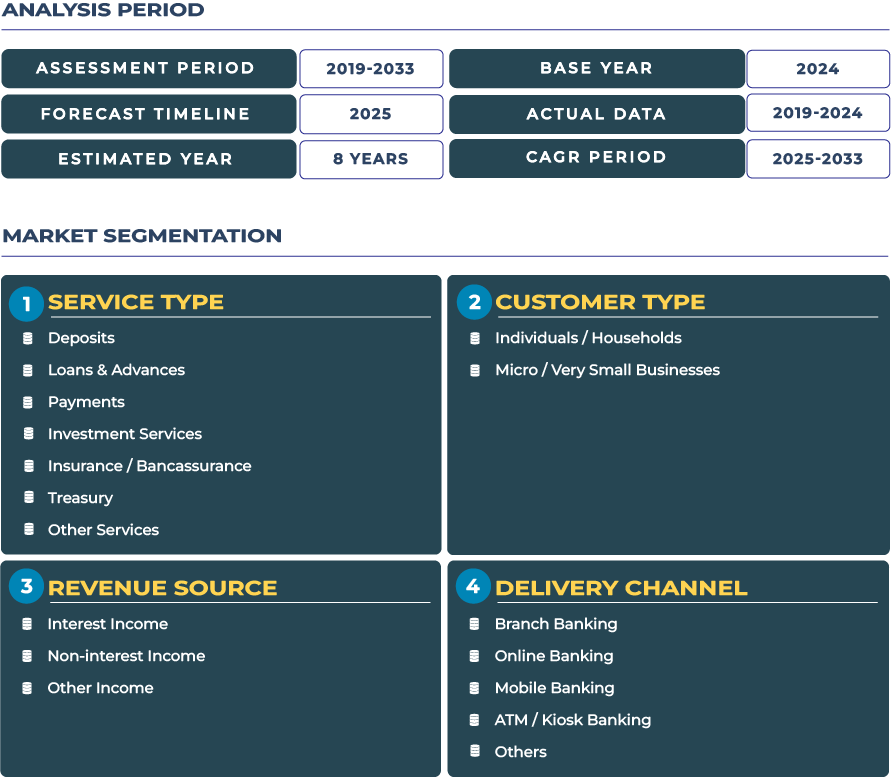Market Outlook: Blockchain-Enabled Transformation Driving South Korea Retail Banking Evolution
South Korea retail banking market is undergoing a transformative shift fueled by blockchain integration, artificial intelligence (AI) applications, and a growing appetite for digital innovation among tech-savvy consumers. With a projected growth from USD 52.7 billion in 2025 to USD 82.9 billion by 2033, the sector is expected to expand at a healthy CAGR of 5.8%. The country's forward-thinking approach to digital finance-supported by regulatory oversight from the Financial Services Commission (FSC) is enabling a robust ecosystem that fosters blockchain banking, decentralized digital wallets, and AI-driven financial advisory services.
Note:* The market size refers to the total revenue generated by banks through interest income, non-interest income, and other ancillary sources.
Blockchain-powered transaction verification, smart contracts, and digital asset management platforms are rapidly redefining traditional banking processes. The integration of AI and blockchain is enhancing customer experience and financial transparency, reducing operational risks, and enabling new forms of value creation. The demand for secure, real-time banking experiences continues to surge as consumers increasingly rely on mobile-first solutions for payments, deposits, and investment management. This convergence of technology and regulation positions South Korea as one of the most dynamic retail banking landscapes in Asia.
Drivers & Restraints: Technology-Driven Growth Amidst Regulatory Complexities
The primary growth engine for South Korea retail banking industry lies in its unmatched technological infrastructure and digital adoption rate. High smartphone penetration exceeding 95%, coupled with a digitally literate population, has created a favorable environment for mobile banking and blockchain integration. Strong fintech partnerships and a well-regulated ecosystem driven by government initiatives further enhance the competitiveness of domestic banks. The expanding role of digital-only banks such as K Bank and KakaoBank illustrates how innovation and inclusivity are reshaping the banking experience for younger demographics and underserved communities.
However, the market faces challenges related to cybersecurity and compliance management. As blockchain and AI technologies advance, so do the complexities of safeguarding financial data. Stringent oversight from authorities such as the FSC ensures consumer protection but also increases the regulatory burden on smaller fintechs and digital banks. Additionally, global competition from multinational banks entering the digital space adds pressure to local institutions to innovate while maintaining cost efficiency and risk mitigation frameworks.
Trends & Opportunities: Digital-Only Banks and Blockchain Banking Ecosystems
The evolution of digital-only banks continues to dominate the South Korean retail banking market. Institutions are leveraging blockchain to improve transaction transparency, compliance tracking, and digital identity management. The rise of mobile-first payment platforms such as Samsung Pay and Toss is driving higher transaction volumes, particularly among millennials and Gen Z customers who favor convenience and instant services.
Looking ahead, opportunities abound in expanding blockchain-based financial solutions and AI-driven advisory platforms. Banks are actively exploring AI algorithms to deliver hyper-personalized investment insights and predictive risk analytics. The collaboration between domestic banks and technology providers will likely accelerate innovations in cross-border remittances and crypto-asset management. Financial institutions like Shinhan Bank are investing in blockchain-enabled settlement systems and AI-backed robo-advisory services to enhance operational efficiency and customer engagement. These advancements not only strengthen trust but also redefine customer interaction models across deposits, loans, and investment services.
Competitive Landscape: Local Banks Leading Blockchain Innovation
South Korea retail banking sector features a balanced mix of established players and emerging fintech entrants, each contributing to the country’s innovation-driven growth. Major players such as KB Kookmin Bank, Shinhan Bank, Hana Bank, and Woori Bank are increasingly investing in blockchain-backed payment networks, cybersecurity frameworks, and decentralized transaction systems. In 2024, Shinhan Bank announced its collaboration with a blockchain consortium to enhance interbank settlement transparency and security, marking a strategic step toward next-generation digital banking infrastructure.
Global competition is also heating up as foreign institutions seek partnerships with local fintechs to tap into South Korea advanced digital infrastructure. These alliances are fostering innovation in retail lending, micro-insurance, and automated investment services. The market’s focus on digital-first strategies aligns well with the government’s “Digital Finance Roadmap,” positioning South Korea as a regional hub for financial technology leadership and cross-border digital banking expansion.







